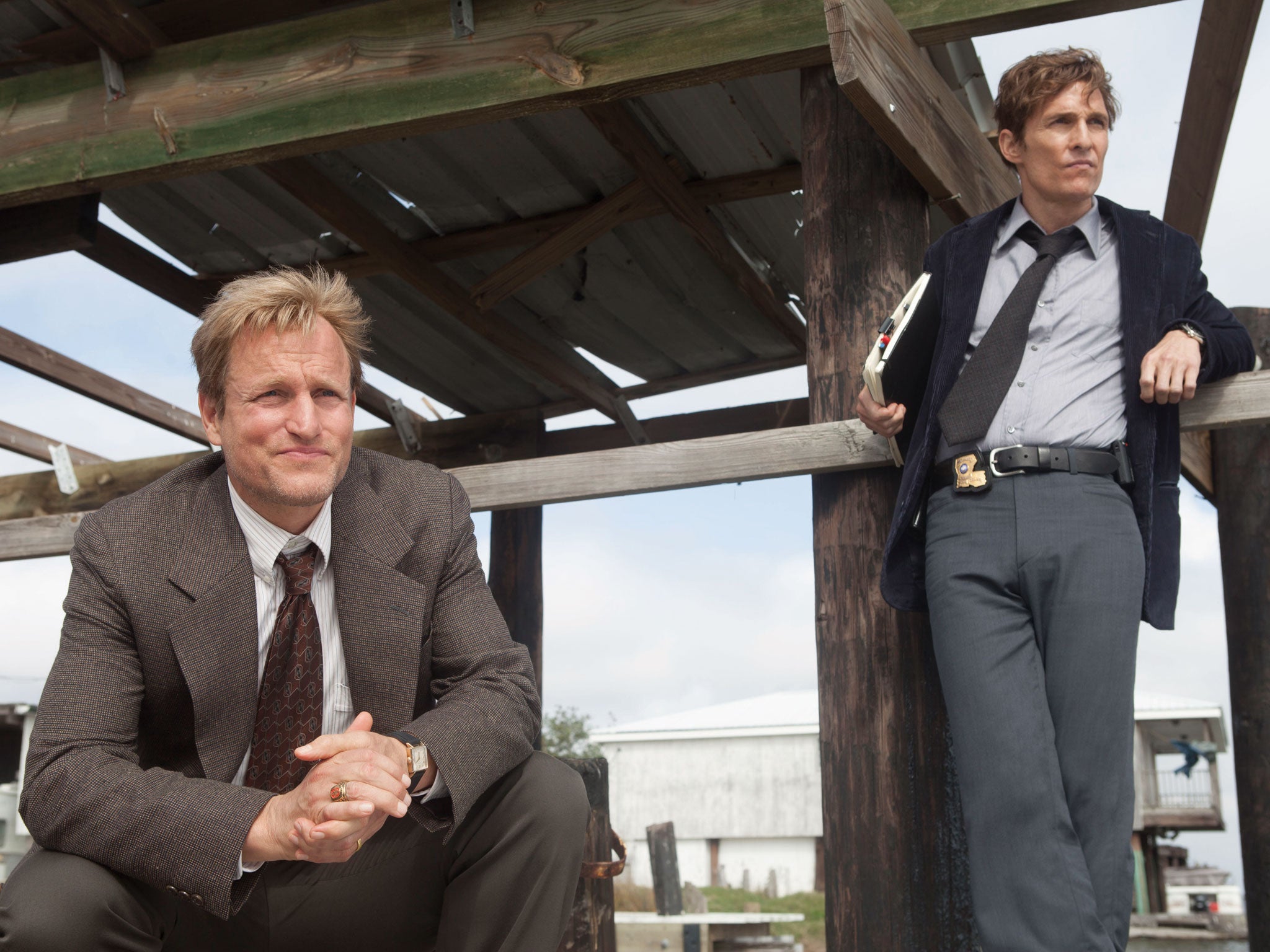Grace Dent on TV: True Detective, Sky Atlantic
It’s the detectives who are the conundrum in this murder mystery

Part of the Matthew McConaughey “McConnaissance” – yes, that’s a real showbiz buzzword right now – is the new Sky Atlantic cop import True Detective. One might have observed McConaughey’s “journey” over recent years from billowing shirt rom-com knicker-loosener through to very serious revered Oscar-nominated puller of earnest faces. One may have possibly also observed McConaughey thanking himself during his Oscar-winning speech last week for being “his own hero”, and one might have thought: “Put a sock in it, pal, I remember you when you were playing on Channel Five three times a week and when Jennifer Lopez was planning your wedding.” But Hollywood is a fickle place with room for second acts. A seismic shift has occurred within the man. Maybe it was when he lost an enormous amount of weight for Dallas Buyers Club, or as Tina Fey said at the Golden Globes recently, “what actresses call, ‘being in a movie’.”
Rumblings about the greatness of True Detective – set in eerie Louisiana – began back in mid-January when the show premiered on HBO in the States and morally awry Brits began watching it via illegal internet streams. I cannot condone this behaviour. Watching TV in this manner is like stealing truffle pasta from the lips of HBO board executives, and you’d not do that, would you? Regardless, True Detective, it felt, was having the same gut punch amongst TV connoisseurs as the likes of Breaking Bad or The Killing. It is the sort of TV that turns many viewers into helplessly addicted preachers, roaming social media in search of fellow souls to swap Satanic murder theories, and pushing the show onto any pliable soul who could navigate an illegal proxy site. Personally, I fell asleep within 25 minutes of episode one the first time I attempted it, although I wouldn’t take this as too severe a rebuke. I tried again and found the first episode a gently paced, unsettling piece of work which lingers long after watching. A show where the actual murderer – although clearly vile – is almost superfluous to the narrative, because instead our investigation dwells more upon Rust (McConaughey) and Marty (Woody Harrelson), two mismatched male egos thrown together to investigate a murder but who instead slowly eat each other.
Yes, we’ve seen mismatched detectives pissing each other off in police cars since the beginning of televisual time. Here are some more. One is a loner and the other is a man’s man. One is an innovator and the other loves police work done how it’s always been done. The fact Harrelson’s character speaks in muffled grunts like he is perpetually eating a bowl of Ready Brek, and McConaughey’s character – an erudite, troubled soul – replies mainly to questions that were never posed, makes their friendship an even more arduous affair.
In the opening 10 minutes of episode one the detectives find the corpse of an attractive woman– lilac with rigor mortis – blindfolded, tied to a tree in the kneeling pose with her bumcheeks spread and a pair of antlers attached to her head. They don’t find a young man’s sexually assaulted body or an old wrinkly lady’s body because in TV world beautiful, dead, raped, defiled women are a very sexy, sellable thing. Pretty girls tend to have pretty friends and they will probably have got up to all sorts of naughty bad-girl mischief in local brothels and strip clubs before their comeuppance for the male protagonists to investigate. This in itself is great telly. In True Detective’s defence, this timeworn tale of girls gone wrong and egotistical male cops is the perfectly at home in it’s claustrophobic Louisiana setting where 1995 could be 1955. Rust and Marty are big chiefs in a world where wives stay home and fix dinner and the word of God and racism keeps everyone in their requisite place. Marty’s wife is a wretched soul. Clearly intelligent and with flashes of charisma, yet married to a detective who belittles her and freezes her out, Maggie is trapped and depressed but there is literally nowhere to run. In the second episode Marty attempts to take on a brothel madam who claims she gave girls a chance to experience life, earn their own cash, and live away from violent homes. Marty laughs in her face, but having seen the state of Louisiana one can’t help feel she has a salient point.
As the narrative jumps between 1995 and 17 years later, where the men’s partnership is very much estranged – McConaughey’s character now largely unrecognisable – something very serious has occurred. It’s this hook that keeps me moving on with True Detective. Why does Rust now resemble the Wild Man of Borneo? Seventeen years ago he was a committed law-enforcer – give or take a few pills. In fact, he was nicknamed The Tax Man due to his need to note myriad observations on crime scenes in a large accountancy notebook. And why do the police think Rust can help them with their current investigations when nowadays he can barely string a sentence without the steadying aid of six cans of beer? This is dark and important television. McConaughey has already declined to appear in a second series of True Detective. That’s the problem with chasing your hero. There’s always just so much to do.
Join our commenting forum
Join thought-provoking conversations, follow other Independent readers and see their replies
Comments
Bookmark popover
Removed from bookmarks